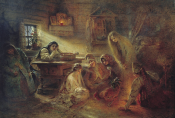
Presidential Library tells about Twelve Days of Christmas traditions in Russia
The period between the holidays of Christmas (January 7) and Epiphany (January 19) in Russia is called Svyatki (Yuletide). During this time, people believed that the boundary between the human and spiritual worlds became blurred, making it a perfect time for divination. This was especially true around the winter solstice.
In the book Russian Yuletide: Songs, Music, and Fortune-Telling (1835), Vasily Alferyev recounts the ancient Yuletide traditions, which he believes are being forgotten.
Vasily Alferyev goes on to say that even Peter the Great, dressed with his friends, would ride on Christmas Eve. He also mentions the stories of the old times, recalling Yuletide celebrations under Empress Elizabeth Petrovna, when she herself would sing Yuletide songs and enjoy dressing up for the occasion.
The book includes examples of Yuletide fortune-telling rituals and songs, providing a glimpse into the rich history of this beloved holiday.
The genre of the Christmas story, also known as the Yuletide tale, has been established in Russian literature. These stories are built according to a specific Yuletide canon, which includes the presence of a Christmas miracle, transformations, and a "happy" ending.
On the Presidential Library's portal, the story Christmas Dream by Priest John Galabutsky is available. The main character, Petya Candle, is a twelve-year-old boy who is worried about how he will recite one of the most significant parts of the morning service at the Christmas celebration - the sixth psalm.
The electronic collection of the Presidential Library includes a handwritten document that was recently added to the library's collection and is now available to users through the institution's online portal. This document is a letter written by Grigory Klodnitsky, a priest from the Lepel district in the Vitebsk province. The letter, dated June 10, 1850, is addressed to the Russian Geographical Society and contains information about fasts, holidays, and customs and beliefs associated with them.
Grigory Klodnitsky describes the details of how the peasants observe the Christmas fast: "The fasting days of the peasants are not much different from the fasting days in terms of food. Herring and fresh boiled fish, without any seasonings, make a delicious and luxurious dish. Women usually spin and sing Christmas carols during the fast, sit down to dinner at noon, and go to bed at dusk."
Russians can learn more about the history and traditions of this holiday on the Presidential Library's portal, in Ivan Bozheryanov's book How the Russian people celebrate Christmas, New Year, Epiphany, and Maslenitsa (1895), the study by the prominent ethnographer Alexander Tereshchenko, The Life of the Russian People (1848), and by reviewing the materials in the collection New Year and Christmas in Russia.

